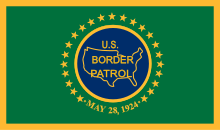US Border Patrol
| United States Border Patrol | |
|---|---|
| Abbreviation | USBP |

Seal and patch of the United States Border Patrol
|
|

Badge of the United States Border Patrol
|
|

Flag of the United States Border Patrol
|
|
| Motto | Honor First |
| Agency overview | |
| Formed | May 28, 1924 |
| Legal personality | Governmental: Government agency |
| Jurisdictional structure | |
|
Federal agency (Operations jurisdiction) |
United States |
| Size | 19,000 lineal miles |
| Legal jurisdiction | INA 235 & INA 287. Title 8 USC, 18 USC, 19 USC & 21 USC |
| General nature |
|
| Specialist jurisdiction | National border patrol, security, and integrity. |
| Operational structure | |
| Headquarters | Washington, D.C., U.S. |
| Border Patrol Agents | Congress Mandated 21,370 |
| Agency executive | Ron Vitiello, Chief, U.S. Border Patrol |
| Parent agency | U.S. Customs and Border Protection |
| Website | |
| United States Border Patrol | |
The United States Border Patrol (USBP) is an American federal law enforcement agency. Its mission is to detect and prevent illegal aliens, terrorists and terrorist weapons from entering the United States, and prevent illegal trafficking of people and contraband. It is the mobile, uniformed law enforcement arm of U.S. Customs and Border Protection (CBP), a component of the U.S. Department of Homeland Security (DHS).
With over 21,000 agents, the U.S. Border Patrol is one of the largest law enforcement agencies in the United States.
The Chief of the U.S. Border Patrol is Ron Vitiello.
Mounted watchmen of the United States Department of Commerce and Labor patrolled the border in an effort to prevent illegal crossings as early as 1904, but their efforts were irregular and undertaken only when resources permitted. The inspectors, usually called "mounted guards", operated out of El Paso, Texas. Though they never totaled more than 75, they patrolled as far west as California trying to restrict the flow of illegal Chinese immigration.
In March 1915, Congress authorized a separate group of mounted guards, often referred to as "mounted inspectors". Most rode on horseback, but a few operated automobiles, motorcycles and boats. Although these inspectors had broader arrest authority, they still largely pursued Chinese aliens trying to avoid the National Origins Act and Chinese Exclusion Act of 1882. These patrolmen were Immigration Inspectors, assigned to inspection stations, and could not watch the border at all times. U.S. Army soldiers along the southwest border performed intermittent border patrolling, but this was secondary to "the more serious work of military training." Aliens encountered illegally in the U.S. by the Army were directed to the immigration inspection stations. Texas Rangers were also sporadically assigned to patrol duties by the state, and their efforts were noted as "singularly effective".
...
Wikipedia
